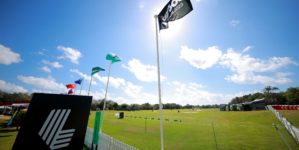-
Trump, Juan Crow and Who Gets to Be an American - 24 mins ago
-
Millions Told To Avoid Drive-Thru Lanes - 34 mins ago
-
How California draws congressional districts, and why it might change in a proxy war with Trump - 47 mins ago
-
Are Cracks Appearing in Trump’s Antitrust Strategy? - about 1 hour ago
-
Donald Trump Responds to Midtown Manhattan Shooting - about 1 hour ago
-
Despite new sales tax to reduce homelessness, LAHSA cuts back an effective path to housing - about 1 hour ago
-
LIV Golf Doubles Down, Reportedly Will Award Record-Breaking Purses In 2026 - 2 hours ago
-
Europe Made Major Trade Concessions to Trump. How Did That Happen? - 2 hours ago
-
A new iteration of Taco María opens, in an unlikely place - 2 hours ago
-
Internet Can’t Cope With Goldendoodle’s Very Millennial Halloween Costume - 2 hours ago
China Fires Back at US Allies: ‘Political Manipulation’-
China’s embassy in the United Kingdom has issued a sharp rebuke after Britain and Australia raised concerns over Beijing’s actions in the Asia-Pacific, slamming the two countries for “unwarranted accusations and political manipulation.”
Why It Matters
The statement followed the arrival of the U.K.’s flagship aircraft carrier, HMS Prince of Wales, in the port of Darwin just three days earlier to take part in Australia’s Exercise Talisman Sabre 2025.
The U.S. and its allies—both within the Asia-Pacific and beyond—have been stepping up security cooperation in response to China’s increasingly assertive actions in the region, as President Xi Jinping seeks to challenge American primacy.
Newsweek reached out to the Australian Department of Defence and the U.K.’s Foreign, Commonwealth & Development Office via emailed requests for comment.
What To Know
The Chinese embassy on Sunday pushed back against a joint statement issued by the U.K. and Australian foreign and defense ministers following their ministerial consultations in Sydney on Saturday.
“We firmly oppose the groundless accusations against China in the U.K.-Australia joint statement. Taiwan, Xinjiang, Xizang [Tibet], and Hong Kong affairs are all China’s internal affairs, in which no foreign country has the right to interfere,” an embassy spokesperson said, responding to criticism of Beijing’s domestic actions.

Ben Stansall/AFP via Getty Images
The joint statement cited China’s “destabilizing” military activities around Taiwan—the self-ruled island Beijing claims as its territory and has vowed to unite with, through force if necessary. Also mentioned were alleged human rights abuses in Tibet and Xinjiang, and suppression of free speech and democracy in Hong Kong.
The spokesperson also objected to the statement’s depiction of China’s behavior in the South China Sea, saying, “The U.K. and Australia should stop hyping up the issue and stirring up trouble.”
China claims most of the busy waterway as its territory—claims that overlap with those of several neighbors and have led to a bitter territorial dispute with U.S. treaty ally the Philippines.
The spokesperson also rejected the joint statement’s call for China to prevent its companies from supplying dual-use civilian-military goods to Russia for use in the ongoing war in Ukraine.
“China has been working actively to promote a ceasefire and peace talks, and has kept dual-use items under strict control,” the official said.
While China has presented itself as neutral in the conflict, it has never called Russia’s actions an invasion, and booming trade with Moscow has helped sustain Russia’s wartime economy—prompting NATO to label China a “decisive enabler.”
What People Have Said
John Haley, British defense secretary, told the Telegraph regarding a potential war over Taiwan: “If we have to fight, as we have done in the past, Australia and the U.K. are nations that will fight together. We exercise together, and by exercising together and being more ready to fight, we deter better together.”
Haley added, however, that he was speaking in “general terms” and that London preferred to see disputes solved “peacefully.”
What’s Next
Exercise Talisman Sabre will conclude on August 4. This year’s iteration—the 11th and largest yet—involves 30,000 military personnel from 19 countries, including the United States.
Source link














